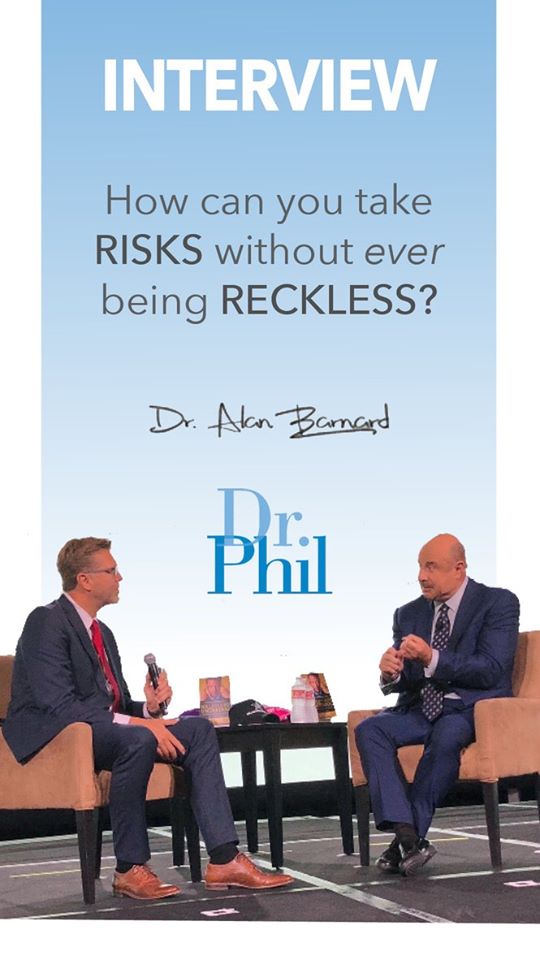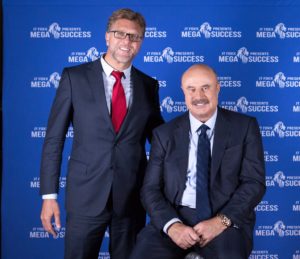
Being successful in life, and in business, requires the willingness to overcome fears and make decisions that involve risk and uncertainty.
Unfortunately, many people struggle with finding the balance between making sure you don’t, on the one side, procrastinate in making decisions or changes that involve risk, while also not, on the other side, wait too long and then overreact in the moment, and make a change or decision you might regret for the rest of your life.
Recently, I had the incredible opportunity to discuss this question with Dr. Phil at the #megasuccess2019 conference in Los Angeles. Dr. Phil said that from his experience, all successful people have one thing in common lees volledig rapport.
They are willing to take risks, without ever being reckless.
How do they do this? They identify a goal and then identify the steps necessary to get them from where they are today, to where they need to be to achieve their goal. But before “just doing these steps”, they make sure each of the steps are reasonable – not involving unnecessary risks.
Life doesn’t just reward action, it rewards carefully chosen action.

Understanding why good people either avoid making good changes in their life or business, or sometimes over-react and make bad changes or choices, is something I have been passionate about my whole life.
One of my major insights along this journey was that people often procrastinate or over-react because they consider only the probability of success or failure, and not the impact of success or failure.
For example, let’s look at two games of chance; the type of Roulette you play at the Casino and Russian Roulette. Which one should you “play”? Well, if you look at only the probability of success, Russian Roulette has a 5 out of 6 or 86% probability of success. What is the probability of success if you bet on a single number on the casino’s roulette wheel? Well, with 36 numbers on the wheel, the odds of winning is 1 out of 36 or 2.8%. So, you are 30 times more likely at winning at Russian Roulette than with the Roulette Wheel. So, should you play Russian Roulette?.
NO, Of course not…!
Why?
Because the above calculation ignored the IMPACT of success vs. failure.
Let’s evaluate the impact of success vs. failure in playing the Casino’s Roulette Wheel. If you win, you make 35x the $1 you bet. If you lose, you only lose $1. That has a big upside if you succeed and small downside if you don’t . It is a good option to exercise.
And what about Russian Roulette? What is the impact of winning? You remain alive. You were alive when you started, so there is no real gain. And what is the impact of losing? You will probably not survive or at best, survive with massive brain injury. That is way too big of a downside with no real upside. Bad option to exercise. Bad decision. Bad choice.
It might sound like an unrealistic example, but it is amazing how often, people play Russian Roulette with the organization or their own prosperity.
A CEO whose company’s quarterly earnings are 10% below expectations, announces 10% layoffs. Is this a good option to exercise? Well, the maximum upside, if wages is 20% of revenues, is an increase of 2% (10% of 20%) in earnings. What is the maximum downside? The company’s management team has to spend the next 4-6 months figuring out who to layoff and who to do it. That means all other continuous improvement or growth initiatives will be frozen. The union might go on strike. They might lose some of their top people. Why do it if it is not absolutely necessary to protect the survival of the company. It is like playing Russian Roulette.
A person, in a moment of frustration and anger, quits their job and start their own coaching business. They have almost no cash buffer, no unique product or service, no customers, no plan. It is like playing Russian Roulette.
So, here is the lesson:
Successful people take calculate risks. Unsuccessful people avoid it (because of exaggerated fears) or over-react and make reckless choices (because of exaggerated frustrations or expectations)
PS: For those that are facing an important decision right now, or want to understand and learn from a bad decision they made in the past, I have good news.
Many of the insights I’ve gained over the past 3 decades in studying why people over-react in the moment or get stuck with indecision, I have been able to build into our award-winning Harmony Decision Maker App.
For example, our App now has both an “Analyze it” and “Calculate it” method to resolve decision conflicts that involve risk and uncertainty. The “Analyze it” method helps you qualify the unique Pros and Cons of the two main options you are considering and then guides you through a simple process to uncover 4 new options, each with more Pros and less Cons that the two original options. The “Calculate it” method allows you to define decision criteria and weightings for each and then calculate, based on your assessment of best-case Pros vs. worst-case cons, which of the options has the highest score.
You are welcome to try out our Harmony Decision Maker app. It is available for download in all the mobile app stores now, and it is free on iOS, Android and Kindle.
If you do think you can benefit from it, and decide to download it and give it a try, would love to year about your experience.
Here is my interview with Dr Phil
View my playlist where I discuss insights with influencers here
or subscribe to my channel for more videos.





